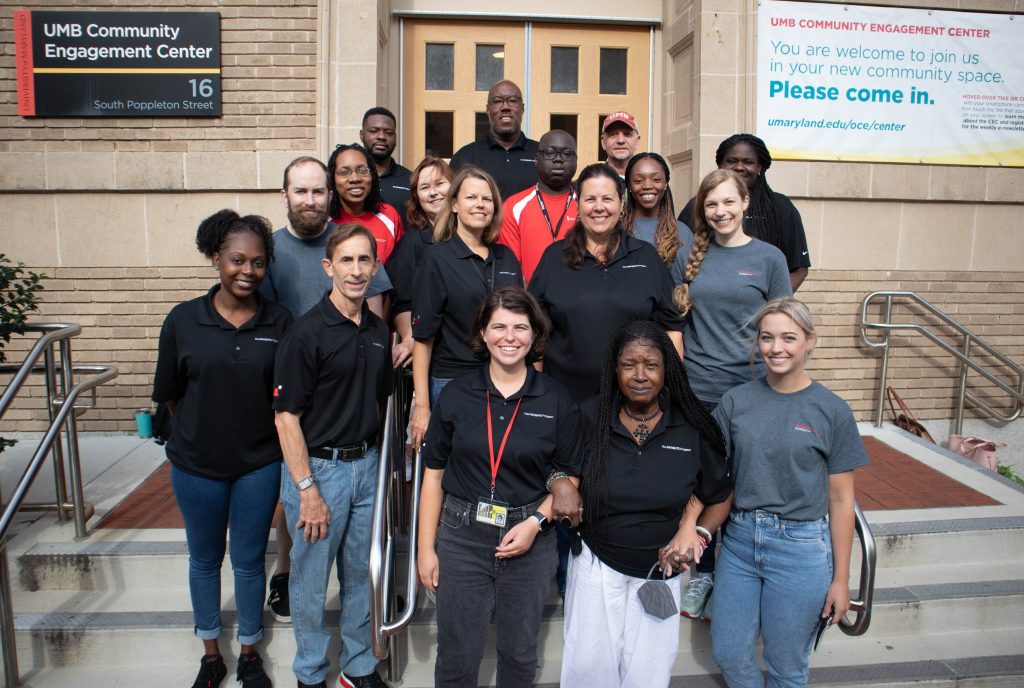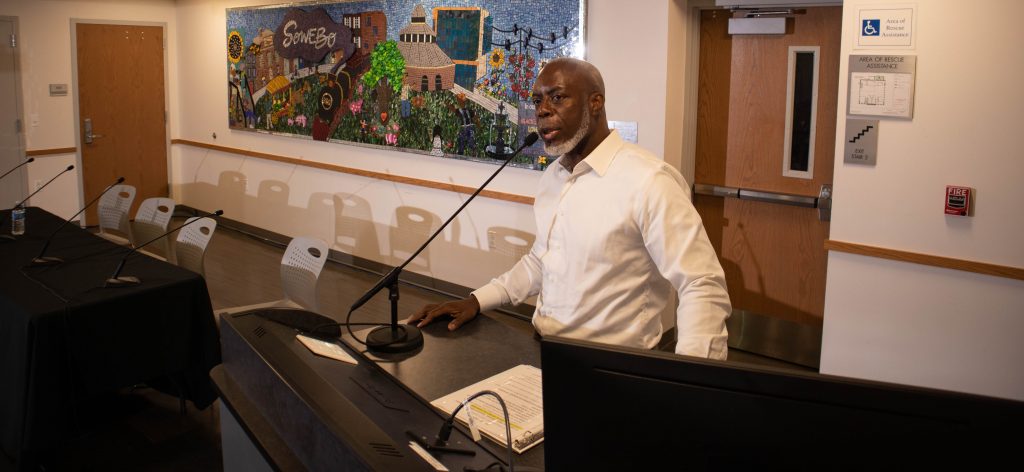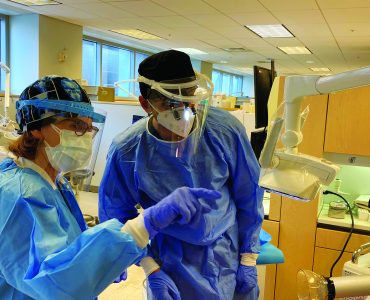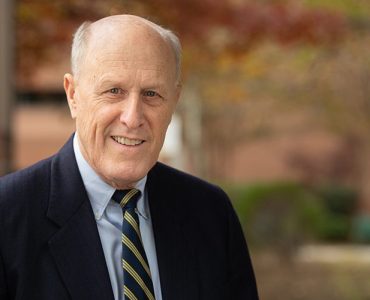School of Pharmacy program works to amplify community’s voice in the areas of research and care.

Trust. It’s a strong word that takes years, often decades, to develop, especially between health care researchers and residents in a challenged community like West Baltimore.
But thanks to the University of Maryland School of Pharmacy and its PATIENTS Program, that distrust of medical research, which goes back generations, is slowly fading as the goal of reducing health inequities grows. Using patient-centered outcomes research, the team gives patients, especially those from minority populations, a say in their own care and lets them guide research that ultimately improves that care for others.
“As a researcher, I began to realize that instead of analyzing data and then presenting what we found, we really should be talking to patients upfront,” says C. Daniel Mullins, PhD, professor at the University of Maryland School of Pharmacy (UMSOP) and executive director of the PATIENTS (PATient-centered Involvement in Evaluating the effectiveNess of TreatmentS) Program. “Yes, it’s important to collect and analyze data. But if we’re not asking the right questions, then the results aren’t going to have the impact they could.”
Adds social impact consultant DeJuan Patterson, MPA, “We allow the community stakeholders and the researchers to come together at the beginning of the project to set their expectations and goals. This will result in a level of increased trust and affirmation. Communities will feel more empowered and valued.”
Karen Morales, associate director of engagement for the PATIENTS Program, has seen this growth firsthand. The program hits close to home with Morales, whose father is Hispanic and whose mother is Black.
“I come from an underserved and underrepresented health care community in New Jersey,” says Morales, who joined the University of Maryland Medical System in 1991 and has been part of the University of Maryland, Baltimore (UMB) since 2000. “The PATIENTS Program is striving to make a dent in health inequity, helping to improve the lives of those who may not have had the opportunity to have their voices heard in the past. So, for me, that’s critical.”
Morales and her engagement team (Rodney Elliott Sr., Adebukola Oluyole, and Barbarajean Robinson-Shaneman) make that happen by going out in the community, meeting, greeting, knocking on doors, passing out flyers, and starting the conversation about health care.
“We engage the community,” Morales says of the PATIENTS Program, which this year won UMB’s Rev. Dr. Martin Luther King Jr. Diversity Recognition Award for Outstanding Staff. “We’re out there. We’re not doing what Dr. Mullins calls helicopter research, where you swoop into a community, grab what you need, and then disappear. We’re there for the long term.”

Rev. Franklin Lance, DMin, senior pastor at Mount Lebanon Baptist Church, can vouch for that.
“The church has been working with the School of Pharmacy and Dr. Mullins for over 10 years now,” Lance says. “We’ve developed a sincere and authentic relationship, the two entities and the two individuals, so we look for opportunities that will serve West Baltimore, the community, and the people that reside within it.”
Mullins says Lance is more than just a PATIENTS partner. On “The UMB Pulse” podcast in April, Mullins said a new initiative, COMMIT, stemmed from Lance’s ideas. Working with UMSOP, Lance, who also heads the Parks and People Foundation, persuaded CVS Health to pay to refurbish the church basement to be a job training program for pharmacy technicians.
“We thought this is a great opportunity to bring together what the community says they want, which is job training, with an opportunity to talk about health and health-related research,” Mullins says.
Now a Mount Lebanon parishioner is coordinating the job training program. “The work we’re doing is not just benefiting the PATIENTS Program, it’s now benefiting the communities we work with,” Morales says. “This ties into the ‘four pillars of health’ PATIENTS is founded on — improving financial, physical, spiritual, and mental health. Research can support that, but we need additional funders as well.”
COMMIT (COMmunity Mistrust and Institutional Trustworthiness project) is not the only funded partnership Mullins has developed with community input. CO-DRIVEN, so named because of the future agenda co-driven by UMB and the Southwest Partnership (SWP), is a new $250,000 award from the Patient Centered Outcomes Research Institute for Mullins’ staff to work with SWP over two years on future research. Another initiative, the PATIENTS Professors Academy (PPA), was launched in July with an initial group of 125 participants nationally who want to learn about community engagement and health care research. Spreading the PATIENTS model beyond Baltimore, PPA is supported by powerful funders such as Bayer, AstraZeneca, and more.
A “phenomenal” hands-on executive director who Morales first worked for as office manager in the UMSOP Department of Pharmaceutical Health Services Research, Mullins is no stranger to grants and contracts. In fact, were it not for a $5 million grant from the Agency for Healthcare Research and Quality in 2012, PATIENTS wouldn’t exist.
But grants are restrictive, explains Morales. “When you have a grant, you have a deliverable and you have to maintain those dollars for that specific deliverable. If you ask a community what they would like to see, that’s not always something a funder is ready to support,” Morales says.
For instance, maybe a patient needs transportation. Or food. Or a book bag. “Sometimes you want to talk about diabetes, but the community members say, ‘How can I think about participating in a research project when my belly’s hungry or I can’t pay the electricity bill or my rent is overdue and COVID took away my job?’ ”
Morales pauses. “I’m sorry. I’m getting a little excited. I just care so much about this cause. That’s what those unrestricted dollars can help us do. But we can’t do it on our own if we’re really going to make a difference.”
Those “unrestricted dollars” are part of a new PATIENTS Program Community Engagement Fund. It allows the program to help improve the lives of the underrepresented, filling in the cracks that aren’t covered by grants.
The rewards of her team’s efforts were on display Aug. 16 when 125 people, most of them community residents, came to UMB’s PATIENTS Day, a free health fair and information session.
“To see the community come out and to hear the feedback has been phenomenal,” Morales says of the first in-person PATIENTS Day since 2019. “We had individuals asking, ‘How can I become part of the Professors Academy? How can I get others to join?’ So that was from our engagement efforts, that buy-in, that trustworthiness. It’s very encouraging. We still have work to do, but we’re getting there. We can’t do it alone, however.”
Help support the PATIENTS Program through its Community Engagement Fund.



